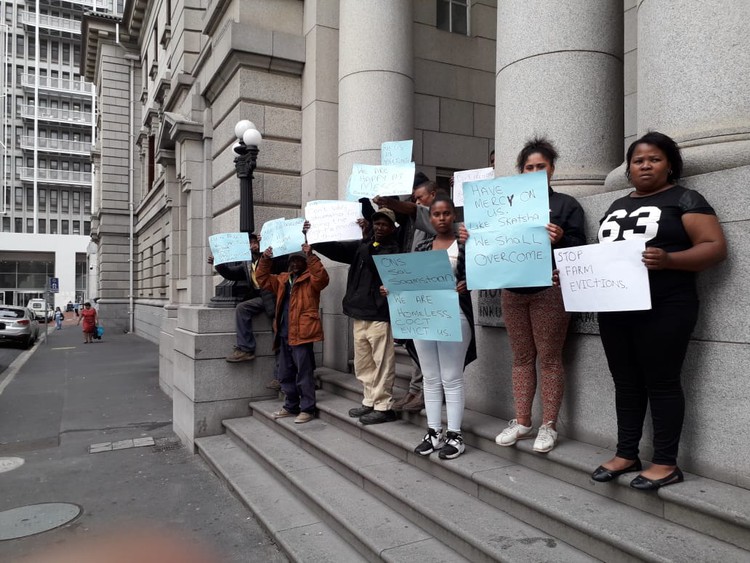
Families who were moved to the Mesco farm after their eviction from Klein Akker demonstrate outside the Western Cape High Court on Wednesday. Photo: Vincent Lali
20 September 2019
The government agreed in court on Wednesday not to move any more families onto the state-owned Mesco farm, where the families evicted from a Kraaifontein farm were moved by Deputy Minister of Agriculture and Land Reform Mcebisi Skwatsha last month.
Skwatsha allowed the more than 250 people to move onto the Mesco farm last month after they were evicted from the Klein Akker farm in Kraaifontein.
But Ricardo Green, on behalf of wine company Ricmal and the Mesco Farm Workers Cooperative, who lease the farm from the state, objected and applied to the Western Cape High Court to have the families moved.
Green said the company and the co-operative were not wealthy landowners but “persons classified as previously disadvantaged who have … been afforded what is almost certainly a once-in-a-lifetime opportunity to engage in an agricultural enterprise as the owners of that enterprise rather than as salaried employees as we have been in the past”.
He said that if the Die Akker families were allowed to remain on the property, “this once-in-a-lifetime opportunity will be lost to us”.
Green also said the structures in which the families were living, mainly sheds or storage rooms, were “unfit for human habitation”, and the roofs were made of asbestos.
He asked the court to order the families to leave the farm and if they did not do so, to order the sheriff to evict them and move them to accommodation offered by the City of Cape Town.
The City had offered to house the families at its emergency housing site known as Kampies, in Philippi (about 30km away). All but one of the people concerned rejected this offer.
In an order handed down in the Western Cape High Court on Wednesday, Acting Judge Myburgh said the national minister, the deputy minister and the government should not put anyone else onto the property or encourage anyone else to occupy it. The government agreed to the order.
Green’s application to have the existing occupants evicted will be heard on 16 October.
Spokesperson for Ubuntu Rural Womxn and Youth Movement for Wendy Pekeur said she was relieved that the court had not issued an eviction order.
The residents must continue staying on the farm because “they have nowhere else to go,” she said.
Peuker said: “The farm has a potential for subsistence farming. They can make a decent living, and a farm worker village can be established there.”
Outside the court the Die Akker families carried placards reading: “Have mercy on us like Skwatsha”, “We are homeless”, “We are happy at Mesco” and “Stop farm evictions.”
Angeline Louw, 32, who lives with six children, said she felt safe on the farm and it was close to the children’s school.
Louw said: “We are angry with the person who wants to remove us from the farm. We are not bad people. We are just homeless.”
Michelle Croy, 17, said: “I’m happy to stay at Mesco as we have water and toilets and a roof over our heads.”
Community leader Tanya Bowers said the families did not want to leave the state-owned farm as “they are in a familiar environment that is safe from health risks and crime”.
“They should have a right to safe accommodation, basic needs and programmes to empower them to become self-reliant.”